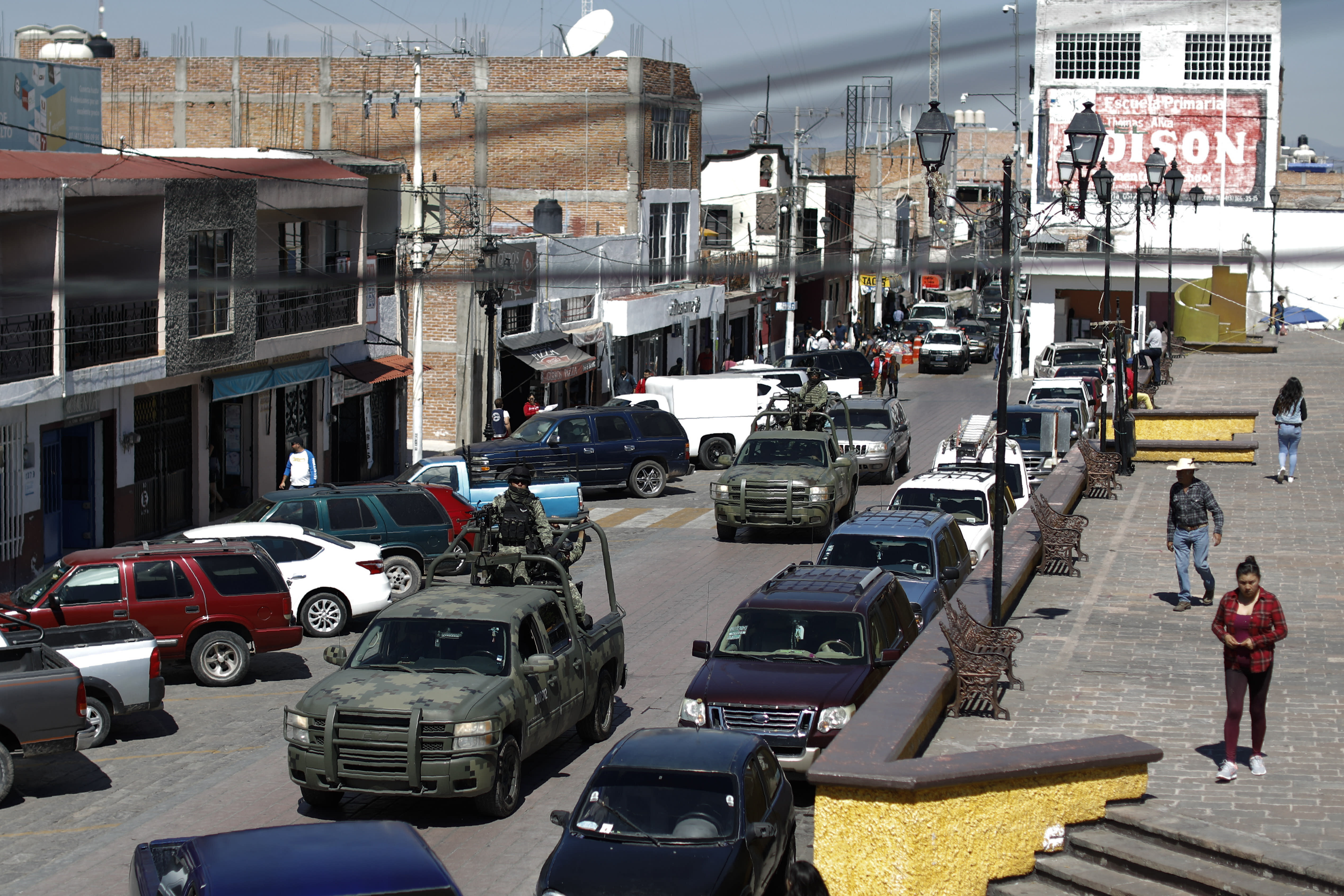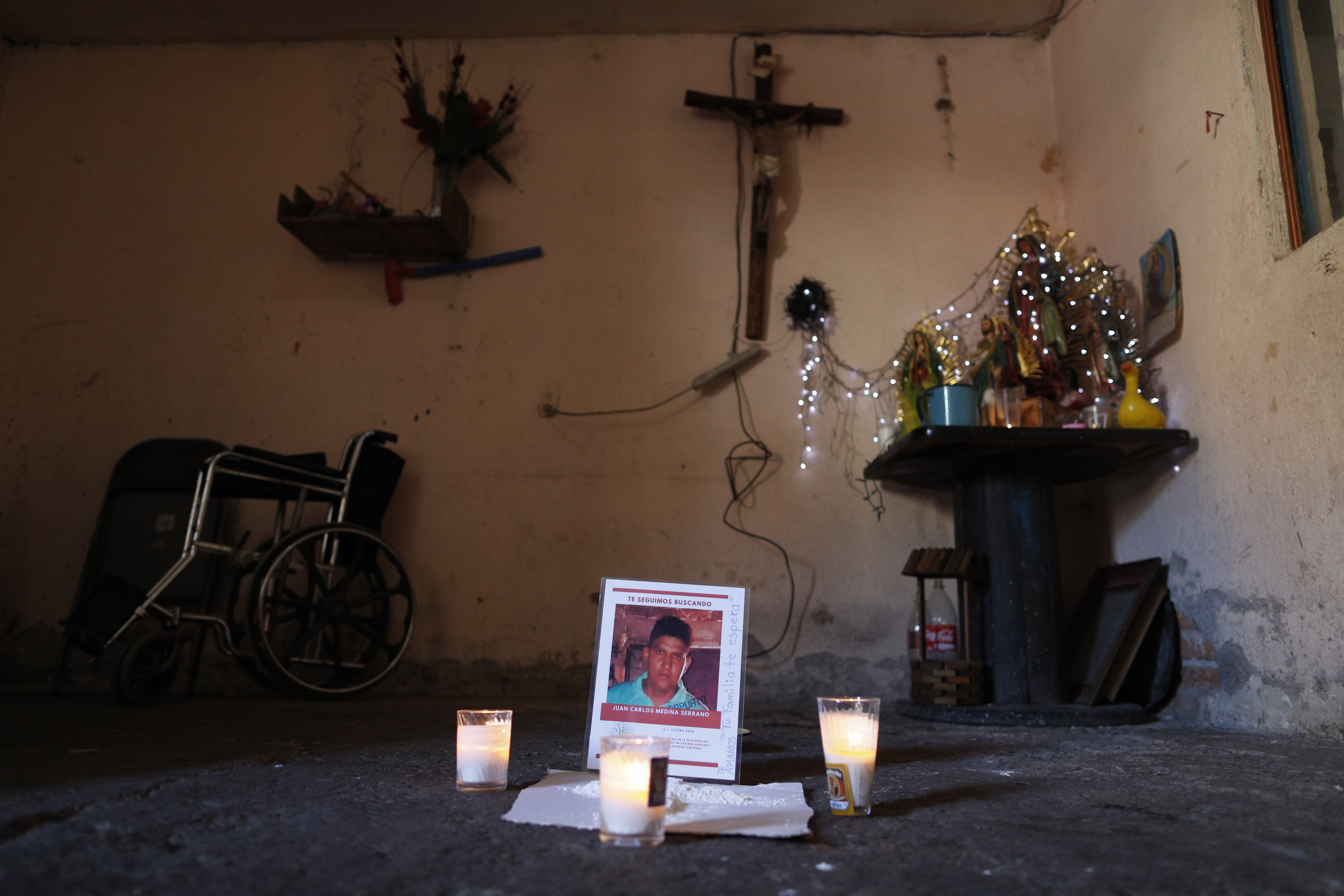Cartel battles stun once-peaceful state in central Mexico
Mexico Cartel Meth War
MEXICO CITY (AP) — The two most powerful drug cartels in the hemisphere are battling over the industrial and farming hub of central Mexico — a state that has attracted gangs for the same reason it has lured auto manufacturers: road and rail networks that lead straight to the U.S. border.
Guanajuato was long a relatively tranquil and well-heeled part of Mexico, a state famed for colonial tourist towns such as San Miguel de Allende, the annual Cervantes culture festival and sprawling factories building cars for the U.S. market.
But violence has exploded over the past decade, and now life or death can depend on the color of methamphetamines sold on the street: one cartel's blue meth versus its rival crystal-clear drug.
Mexico's sixth most populous state saw over 3,400 homicides in the first nine months of this year, more than any other state in the country.
It has also suffered the deaths of more police officers in the line of duty than any other Mexican state.
Much of the bloodshed is due to a clash between the rising Jalisco New Generation Cartel based in a neighboring state and a local gang named for the town where it originated, Santa Rosa de Lima. The conflict has intensified since the local group, weakened by arrests of its leaders, allied itself with what has long been one of Mexico's most powerful cartels, Sinaloa, which had been alarmed by the Jalisco cartel's rise.
And much of that struggle is for control of the market for methamphetamines — both routes to the United States and locally, where the color of the meth or the markings on the package in an addict’s pocket may determine whether he lives or dies.
The Jalisco Cartel sells crystal-clear meth at $2.30 per dose. The home gang, Santa Rosa de Lima, sells cheaper blue-tinged methamphetamines for $1.40.
Related: Mexico boosts fight against organized crime
“It is a sure sentence of death” for a dealer to be caught with the wrong color of meth, said Guanajuato-based security analyst David Saucedo. “It is almost like a script ... the massacres of street dealers. They will attack funerals, where the (deceased) relative had some kind of links to another gang.”
It is unclear whether the distinct colors are a result of different production processes, or if the colors are intentional; it may be no coincidence that a recently arrested leader of the Santa Rosa gang is nicknamed “El Azul,” or “Blue.”
Both sides also mark the plasticine envelopes with their brands. Jalisco’s may say “CJNG,” the group’s initials, or “Grupo Elite,” or have a drawing of a skull with a bayonet and a pistol. Santa Rosa’s symbol is a triangle, with a skull and two sledgehammers, a reference to the nickname of another arrested leader.
Sophia Huett, the Guanajuato security commissioner, said those markings may matter most. “It is a brand concept based on the label, more than the color, which isn’t always present.”
The battle has come to resemble that of Prohibition-era Chicago, with gunmen shooting up homes or shops where rivals are doing business, either in drugs or other contraband.
“This type of massacre is at locations where drugs or stolen fuel is sold,” Saucedo said. “They will go into a store, a warehouse, a tire repair shop and kill everyone, destroy the location, toss in a hand grenade.”
The Santa Rosa de Lima gang expanded into drugs after a start robbing freight trains and stealing fuel from government pipelines — an activity that drew especially heavy attention from a government furious at the loss of revenue.
With police closing in on him in July, Santa Rosa cartel leader José Antonio Yépez Ortiz — known as “El Marro," or “Sledgehammer” — made a desperate plea for an alliance with the Sinaloa cartel to fend off the Jalisco group, currently Mexico’s fastest growing and most violent criminal organization.
Jalisco already has rolled into at least 20 states, sometimes posting online videos showing columns of heavily armed fighters with homemade armored vehicles and issuing vague and often unmet promises not to kidnap or extort protection payments from civilians.
Saucedo said the Sinaloa gang was reluctant to back Santa Rosa, whose leaders were seen as unsophisticated and untrustworthy gangsters. But "the arrest of El Marro led the Sinaloa cartel to intervene in Guanajuato, to prevent Jalisco from taking control.”
“We had had a war between two cartels, and unfortunately now a third cartel (Sinaloa) has entered the conflict.”
Huett, the state security commissioner, said Santa Rosa and other local gangs provide the larger outside group with "firepower, the manpower, even with experienced criminals, killers, in order to confront the Jalisco organization, to contain their expansion a bit.”
It also sends weapons and money — as well as its own operatives. She said 10 gunmen from Sinaloa were caught this month.
That would be true to Sinaloa’s playbook. In the early 2000s, Sinaloa fought the Juarez cartel for the lucrative border city of Ciudad Juárez by backing local gangs like the Artistas Asesinos and Mexicles against Juárez’s armed branches, La Linea and the Barrio Azteca. Those four gangs turned Ciudad Juárez into a killing field between 2008 and 2012.
In Guanajuato, the killings have reached similar proportions.
In July, cartel gunmen killed 26 people at an unregistered drug rehabilitation center in Guanajuato; the attackers shot every male at the rehab center, letting only the females go.
In late September, gunmen killed 11 people, including four women, at a bar in Jaral del Progreso. Five other people in that town died early this month in a shooting attack on a funeral.
The Jalisco cartel has taken to slicing up rival dealers and neatly arranging their severed limbs in a pile to support the severed head, sometimes with a surprised expression because the victims’ eyelids have been sliced off.
Mexico seizes industrial-scale meth, fentanyl lab in capital
MEXICO CITY (AP) — Soldiers and police in Mexico seized an industrial-scale meth and fentanyl lab that was so big it startled investigators, federal prosecutors announced Sunday.
The lab had chemical preparation vats about two stories tall that could process 11,000 pounds (5,000 kilograms) of raw material at a time, said Felipe de Jesus Gallo of the federal Attorney General’s Office.
“In the Attorney General's Office, we have no record of any seizure of equipment of this size before,” Gallo said.
The mega-lab was uncovered this past week in a storefront advertising industrial cleaning products on the outskirts of Mexico City.
Behind the storefront was a warehouse, with tall stacks of drums and 265-gallon (1,000 liter) tanks holding precursor chemicals, which Gallo said could be used to produce methamphetamines and the synthetic opioid fentanyl.
Code-named “Blue,” the coordinated series of raids also hit other properties in the northern state of Durango, Mexico City and the surrounding State of Mexico.
At one property in Mexico City, authorities arrested an engineer who allegedly built and ran labs for an organized crime group. A drum of what appeared to be a precursor of fentanyl was found as well as written instructions on how to process it.
Authorities also found 290 kilograms of meth “with a high level of purity” at a lab raided in the northern state of Sonora. Gallo said some of the drugs were destined for the United States.
Tying together the raids was evidence that the whole operation was being run by people tied to a group in Sinaloa, home to the drug cartel of the same name.
Mexican marines said they had gathered intelligence indicating fentanyl precursors were being imported from China via a company in Hong Kong. Marines traced a shipment of containers that moved through a Japanese port to the Baja California seaport of Ensenada. The marines said they had found an undisclosed amount of three precursor chemicals in the containers that could be converted into fentanyl through “a simple process.”
NARCOMEX: MEX
PRESIDENT SUCKS OFF BRIBES FROM DRUG CARTELS
https://mexicanoccupation.blogspot.com/2020/03/mexican-president-courts-la-raza-heroin.html
Last year, AMLO (
MEX PRESIDENT) was harshly criticized for ordering the release of El Chapo’s son Ovidio “El Raton” Guzman
Lopez shortly after his military and police forces captured him in Culiacan
Sinaloa
WHILE THE U.S. SQUANDERS HUNDREDS OF BILLIONS AND TROOPS TO
DEFEND THE BORDERS OF MUSLIM DICTATORS WHO HATE OUR GUTS, MEXICO IS OVERRUN
AMERICAN WITH DRUGS!
GRAPHIC: Gulf Cartel Gunmen Burn Rivals Alive in Mexico near
Texas Border
|
|
Mexico Will Reject U.S.
Designations of Cartels as Terrorists, Says AMLO
Mexico’s president announced Monday that he will reject any
designation of cartels as terrorist organizations by the U.S. government.
During his morning press conference, Mexican President Andres
Manuel Lopez Obrador (AMLO) said he would not accept the U.S.’s potential
designation of cartels as foreign terrorist organizations–which could enable
direct actions in Mexico.
“We will never accept that, we are not ‘vendepatrias’ (nation
sellers),” Lopez Obrador said.
The president’s statements come after the relatives of nine U.S.
women and children who died in a cartel ambush in
Sonora revealed they would be meeting with President Donald Trump. The family
is expected to ask for some cartels to be labeled as terrorist organizations.
Last week, Tamaulipas Governor Francisco Cabeza de Vaca used the
term “narco-terrorism” to refer to the brazen attacks on citizens of Nuevo
Laredo by a faction of Los Zetas Cartel called Cartel Del Noreste. Cabeza de
Vaca publicly called out Mexico City for past inaction in confronting Los Zetas.
Earlier this year, Rep. Chip Roy (R-TX) filed legislation for the most violent
cartels in Mexico to be labeled as a foreign terrorist organizations, a move that would limit cartel members’ abilities to travel
and provide tools to better clamp down on financial transactions, Breitbart
Texas reported.
On Monday morning, Lopez Obrador’s foreign relations minister Marcelo
Ebrard called designations unnecessary and inconvenient, adding that the U.S.
and Mexico have a healthy working relationship in fighting cartels. According
to Ebrard, terrorist designations would give the U.S. the legal avenue to take
direct action on cartels on Mexican soil.
Ildefonso Ortiz is an
award-winning journalist with Breitbart Texas. He co-founded Breitbart Texas’
Cartel Chronicles project with Brandon Darby and senior Breitbart
management. You can follow him on Twitter and on Facebook. He can be contacted
at Iortiz@breitbart.com.
Brandon Darby is the managing
director and editor-in-chief of Breitbart Texas. He co-founded Breitbart Texas’
Cartel Chronicles project with Ildefonso Ortiz and senior Breitbart management.
Follow him on Twitter and Facebook. He can be contacted at bdarby@breitbart.com.
Enough Is
Enough’: Josh Hawley Calls for Sanctions on Mexican Cartels
Sen. Josh Hawley (R-MO) said Wednesday that
“enough is enough” and called on the U.S. government to sanction Mexican
officials and cartel members complicit in trafficking meth and killing
Americans.
Hawley called for harsh
retribution against the Mexican cartels complicit in ambushing and murdering
nine American women and children near the New Mexico border.
In the wake of the attack on Americans, as well as the Mexican
cartels’ complicity in Missouri’s meth crisis, the Missouri conservative called
for the U.S. government to sanction the cartel members who are “openly slaughtering
American citizens.”
“With Mexico, enough is enough. US government should impose
sanctions on Mexican officials, including freezing assets, who won’t confront
cartels,” Hawley tweeted Wednesday. “Cartels are flooding MO [Missouri] w/
meth, trafficking children, & openly slaughtering American citizens. And
Mexico looks the other way.”
Hawley said that just over the last 14 days, there had been over
40 drug overdoses coming from drugs across America’s southern border.
Hawley continued, “In SW Mo last two weeks alone, over 40 drug
overdoses & multiple deaths from drugs coming across [the] southern border.
Story is the same all over the state. Cartels increasingly call the shots in
Mexico, and for our own security, we cannot allow this to continue.”
· 6h
With
Mexico, enough is enough. US government should impose sanctions on Mexican
officials, including freezing assets, who won’t confront cartels. Cartels are
flooding MO w/ meth, trafficking children, & openly slaughtering American
citizens. And Mexico looks the other way
In
SW Mo last two weeks alone, over 40 drug overdoses & multiple deaths from
drugs coming across southern border. Story is the same all over the state.
Cartels increasingly call the shots in Mexico, and for our own security, we
cannot allow this to continue
213 people are talking about this
Hawley spent much of his August recess traveling across rural
Missouri, learning what matters to the average Missourian.
This
AM I had the great privilege of meeting Brittany Tune, a nurse, a mother of
two, a follower of God, and a remarkable woman. Born & raised in rural
Shannon Co., she has raised two kids on her own while putting herself through
nursing school & dedicating her life to others
Brittany
says meth is hammering this community. She has many friends & family
members who have been touched by this epidemic. She worries about what it means
for her own kids, ages 15 & 10. It’s much worse now than when she was
growing up, she says
25 people are talking about this
In an interview with Breitbart News in September, Hawley said that meth coming from
Mexico is destroying local Missouri communities.
“Come with me to any town, any town in the state of Missouri of
any size, and I will show you communities that are drowning in meth, drowning
in it. It is literally killing people; it is destroying families it is
destroying schools and whole communities,” he said.
“Missouri is a border state,” Hawley said, adding that “we have
to got to secure the border to stop the meth” and “stop the flow of illegal
immigration.”
Hawley’s remarks about the Mexican cartel attack on Americans
mirrors that of President Donald Trump, who said Tuesday that the
United States was ready for war against the drug cartels.
“This is the time for Mexico, with the help of the United
States, to wage WAR on the drug cartels and wipe them off the face of the
earth,” the president tweeted.
Trump has campaigned on cracking down on violence on the
southern border as well as handling the drug cartels.
During an exclusive interview with Breitbart News, Trump said he
is “very seriously” thinking of designating the drug cartels as foreign
terrorist organizations (FTOs).
“It’s psychological, but it’s also economic,” Trump told
Breitbart News in March. “As terrorists — as terrorist organizations, the
answer is yes. They are.”
Sen. Steve Daines (R-MT) told Breitbart News in May
that he would back Trump’s potential designation of the Mexican cartels as FTOs
and that seizing cartel leader El Chapo’s assets would build the wall and make
the cartels pay for it. In a similar manner to Missouri, Daines told Breitbart
News about how Montana has been ravaged by meth from Mexican cartels.
Daines said that by seizing “billions” of El Chapo’s assets, it
“would absolutely fulfill President Trump’s promise to build the wall and make
Mexico pay for it. In this case, it would be a Mexican cartel paying for it
would be an excellent idea.”
Sean Moran is a congressional
reporter for Breitbart News. Follow him on Twitter @SeanMoran3.
The architect of Mexico's war on cartels was just arrested in
Texas and accused of drug trafficking and taking bribes
Business Insider•December
10, 2019
LUIS ACOSTA/AFP via Getty Images
·
Genaro
Garcia Luna, who was Mexico's public-security secretary between 2006 and 2012,
was arrested in Texas on Monday.
·
Garcia
Luna, the architect of Mexico's campaign against organized crime in the late
2000s, is the latest Mexican official accused of corruption and involvement in
drug trafficking.
·
Visit Business Insider's homepage
for more stories.
A former high-ranking Mexican security official who led the
country's crackdown on organized crime in the mid-2000s was arrested in the US
and been charged with drug-trafficking conspiracy and making false statements.
Genaro Garcia Luna, 51, was arrested in Dallas by US federal
agents, according to the US district attorney for the Eastern District of New
York, which said it plans to seek his removal to face charges in New York.
"Garcia Luna stands accused of taking millions of dollars
in bribes from 'El Chapo' Guzman's Sinaloa Cartel while he controlled Mexico's
Federal Police Force and was responsible for ensuring public safety in Mexico,"
US Attorney Richard P. Donoghue said in the release.
Garcia Luna faces three counts of conspiracy to import and
distribute cocaine and a fourth count of making false statements with regard to
an immigration naturalization application.
Garcia Luna began his career with Mexico's Center for National
Security and Investigation in the late 1980s before moving to the federal
police in the late 1990s. He was then head of Mexico's federal investigation
agency, AFI, between 2001 and 2005 and secretary of public security, then a
cabinet-level position in control of the federal police, between 2006 and 2012.
Genaro Garcia Luna Felipe Calderon Mexico
ALFREDO ESTRELLA/AFP/GettyImages
He was 38 when appointed to the latter position by
then-President Felipe Calderon but already had nearly 20 years of experience in
Mexico's security services, much of it spent tracking organized crime and drug
trafficking.
"By his late 20s, he was considered something of a
wunderkind," according to a 2008 New York Times
profile.
"He really was the architect of Calderon's war on
drugs," said Mike Vigil, former chief of international operations for the
US Drug Enforcement Administration, who worked with Garcia Luna in Mexico in
the 1990s.
That war comprised major military deployments inside the country
and the kingpin strategy, which entailed targeting high-level cartel figures in
an effort to weaken the cartels. This approach has been criticized for
fostering more violence, both by state
forces and fragmented cartels.
According to the release, Garcia Luna received millions of
dollars in bribes from the Sinaloa cartel. In return, the release states, the
cartel received safe passage for drug shipments, sensitive law-enforcement
information about investigations targeting it, and information about rival
cartels — all of which allowed it to move multiton quantities of drugs into the
US.
Financial records obtained by the US government showed that by
the time Garcia Luna relocated to the US in 2012, he had a personal fortune
worth millions of dollars, according to the release, which said he is also
accused of lying about those alleged criminal acts on an application for
naturalization submitted in 2018.
'Another black eye for Mexico'
El Chapo Joaquin Guzman
Reuters
One detail in the release mirrors allegations made
during the trial of
Sinaloa cartel chief Joaquin "El Chapo" Guzman, who was convicted on
drug trafficking and other charges in the Eastern District of New York in
February.
"On two occasions, the cartel personally delivered bribe
payments to Garcia Luna in briefcases containing between three and five million
dollars," the release states.
During testimony in November 2018, Jesus "El Rey"
Zambada — the youngest brother of Ismael "El Mayo" Zambada, who is
considered Guzman's peer at the top of the Sinaloa cartel and now its de facto
leader — said the cartel twice made multimillion-dollar payments to Garcia
Luna.
A $3 million payment, which "El Rey" said was to
Garcia Luna at a restaurant in Mexico City between 2005 and 2006, was to ensure
he would pick a specific official as police chief in Culiacan, the capital of
Sinaloa state and the cartel's home turf.
"El Rey" said the other payment, between $3 million
and $5 million, was in 2007 and was to make sure "he didn't interfere in
the drug business" and that "El Mayo" was not arrested. Zambada
also said that the Sinaloa cartel and its partners also pooled $50 million in
protection money for Garcia Luna.
A press officer for the Eastern District of New York did not
immediately respond when asked by email whether the charges unsealed Tuesday
against Garcia Luna stemmed from allegations made during Guzman's trial.
At the time, Garcia Luna denied Zambada's claims, calling them a
"lie, defamation
and perjury."
On Tuesday, Calderon said he had heard of Garcia Luna's arrest but was awaiting
confirmation and further details, tweeting that his "position
will always be in favor of justice and the law."
El Chapo Guzman home town
REUTERS/Roberto Armenta
Vigil, who was the DEA assistant country attache to Mexico
during the 1990s, was skeptical of the allegations made during the Guzman trial
and said he was "surprised" by the arrest on Tuesday.
"I worked with Genaro Garcia Luna," Vigil said.
"We, DEA, had a very good working relationship with Genaro. At that time
there were no allegations of corruption. There we coordinated investigations
with them, and we never saw any evidence of compromise."
The allegations made during that trial seemed "less than
credible," Vigil said, in large part because Guzman was arrested twice
during the administration of President Enrique Peña Nieto, who followed
Calderon into office in 2012.
But it was possible that a high-ranking Mexican official could
obscure activities in one area from their work with the US in another area.
"In terms of what the US sees, [it's] very different than
what occurs within the Mexican government, but through time if he were taking
bribes, obviously some of those investigations, you would've known if they had
been compromised," Vigil said. "But there's some areas that could be
compartmentalized in terms of efforts by the Mexican government."
If convicted on the drug-conspiracy charge, Garcia Luna faces a
mandatory minimum sentence of 10 years and a maximum of life in jail.
"Today's arrest demonstrates our resolve to bring to
justice those who help cartels inflict devastating harm on the United States
and Mexico, regardless of the positions they held while committing their
crimes." Donoghue, the US attorney, said in the release, thanking the DEA,
the Department of Homeland Security Investigations, as well as police in New
York City and New York state.
Regardless of the outcome of the case, it tarnishes a bilateral
relationship in which cooperation against organized crime and drug trafficking
has been a major component.
"I don't know what the evidence is against Genaro Garcia
Luna," Vigil said Tuesday, "but it certainly is another black eye for
Mexico."
Read the original article
on Business Insider




No comments:
Post a Comment